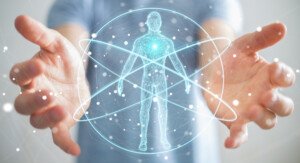Though autism is considered a disability by the ADA, this doesn’t mean that every autistic person feels disabled or views their neurodivergence as a handicap.
I had to put this out there, because it’s important that neurotypicals realize that Autism Spectrum Disorder doesn’t always equate to disability.
As a Spectrum condition, it comes in all sorts of flavors, colors, shapes, patterns — a magnificent variety of presentations.
I may have the same condition, or, as I like to say, “neurotype,” as a person who can’t speak, can’t “be reached,” can’t even express basic needs and is literally in their own world – a universe that’s inaccessable to this individual’s own parents.
But that doesn’t mean I’m disabled.
My analogy is the condition of oveweight. Two people can have this condition. One is a professional golfer who runs daily, a woman at 5’7 and 170 pounds, while the other is bedbound at 5’7 and 600 pounds. And there’s everything in between.
If an autistic individual views their neurotype as a disability, that is their prerogative.
I’m certainly not going to try to convince them otherwise.
The only person I’ll speak for is myself. Nevertheless, my autism has caused me a lot of challenges. Many of these issues are not visible to others.
But having problems – the kind I’ve had – doesn’t ring up as handicaps to me.
In fact, there are people who use wheelchairs or have artificial legs who don’t even consider themselves disabled.
They ski, play basketball or tennis, have a collection of medals from the Paralympic Games, drive, bathe independently and live on their own.
Sure, they’d be the last one out of a burning building, but this doesn’t mean they would consider themselves disabled.
The world is run by neurotypicals, so of course, many Autistics will struggle in it.
But imagine a world that’s run by Autistics. Wow – many NTs would have a dandy ‘ol time struggling to get through each and every day.
I’ve always considered myself to be highly independent. I went off to college at 17 and saw NTs around me struggling.
There was one student in my dorm, Polly, who was on the school’s cross-country team. Good for her, right? Well, she had a drinking problem and one night passed out – in the hallway.
So did Andre: plastered and in the hallway overnight.
These weren’t kids “having fun.” They had serious problems in the mental health department.
In my view, Polly and Andre had a disability. They couldn’t function without drinking themselves into a stupor.
But because NTs are the super vast majority, and because drinking culture is huge on college campuses, nobody in that dormitory would ever view Polly or Andre as having a disability.
I’m sure there are Autistics who get drunk, too. But the point I’m making is that what’s a disability and what’s not is often open to subjective interpretation.
I don’t ever want anyone to see me as a “person with a disability” just because I have a diagnosis of Autism Spectrum Disorder.
Don’t let the word “disorder” throw you. It’s in ADHD, too.
When I was a personal trainer, I had a client with ADHD. I hardly considered Erin handicapped. She was a school teacher and fully independent.
But occasionally during our sessions she’d express confusion and feeling a little overwhelmed by all the information I was giving her, and she’d attribute this to her ADHD.
Though there are things that are difficult for autistic people that come easy to NTs, there are things that NTs struggle with that don’t phase Autistics. It cuts both ways.
I’d like to think that my Vulcan demeanor in the face of crisis is one of my autistic superpowers.
Instead of being ruled by emotion and fear, I am ruled by logic and tactics.
Hmmm, if you had to choose between me and an NT as your companion in a stuck elevator, you’ll want to choose me.
I speak in terms of generalities, not absolutes. There are Autistics who’d panic from here to the moon and who can be frazzled for days from a sensory meltdown, and there are NTs who refuse to sleep in their home for a week because the neighbor’s house got robbed yet the thief was caught anyways.
At the end of the day, I declare, my ASD is not a disability for me. I’m as self-sufficient and as independent as a person could ever be.
My message is for NTs not to make assumptions that every single Autist is disabled.
 Lorra Garrick has been covering medical and fitness topics for many years, having written thousands of articles for print magazines and websites, including as a ghostwriter. She’s also a former ACE-certified personal trainer. In 2022 she received a diagnosis of Level 1 Autism Spectrum Disorder.
Lorra Garrick has been covering medical and fitness topics for many years, having written thousands of articles for print magazines and websites, including as a ghostwriter. She’s also a former ACE-certified personal trainer. In 2022 she received a diagnosis of Level 1 Autism Spectrum Disorder.
.










































